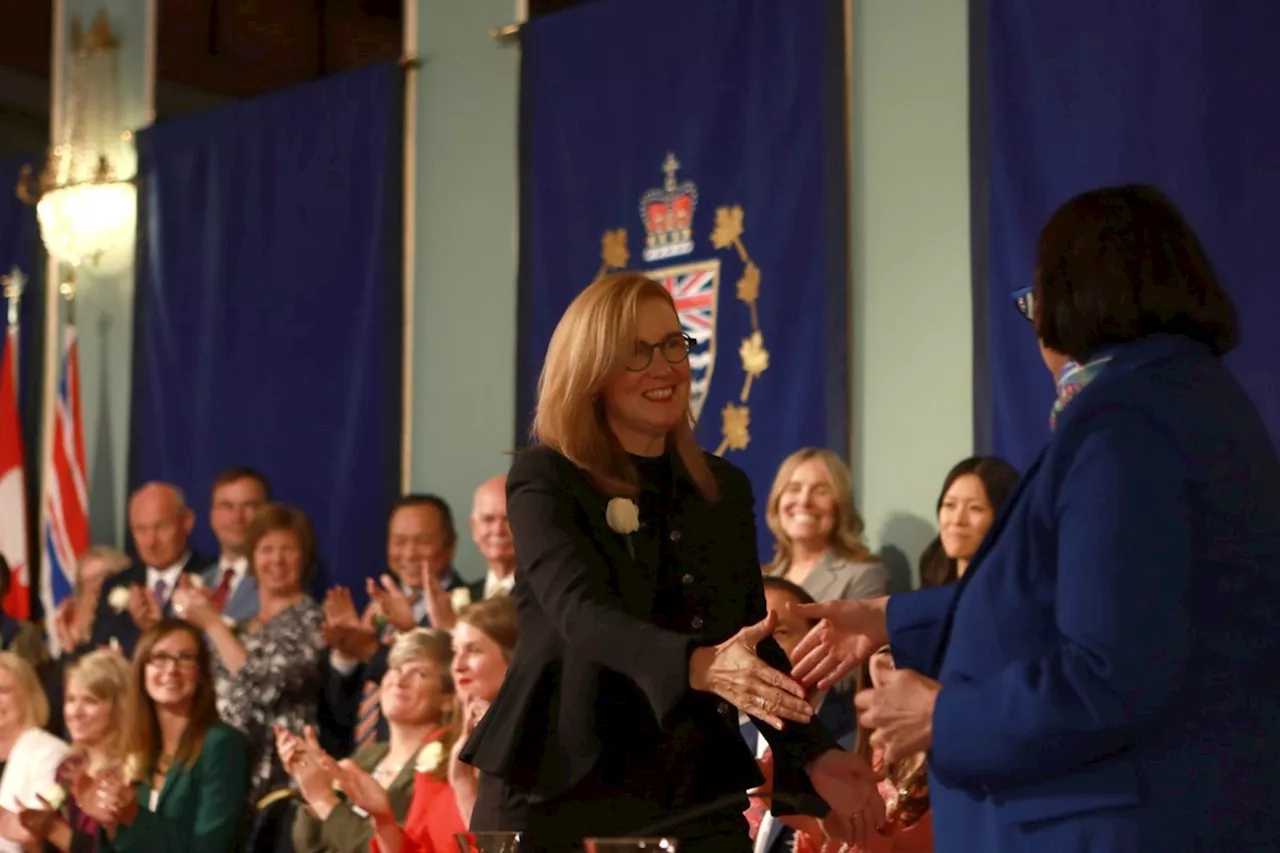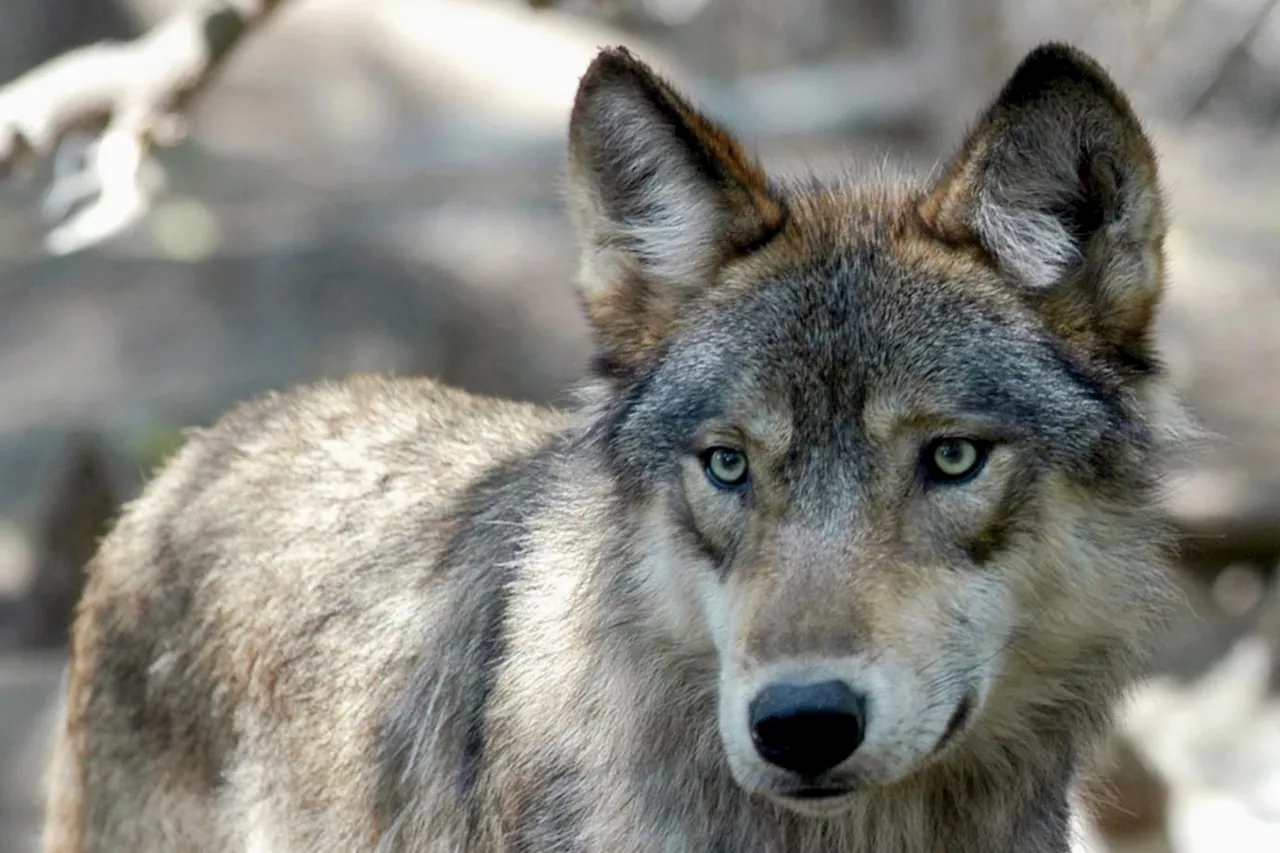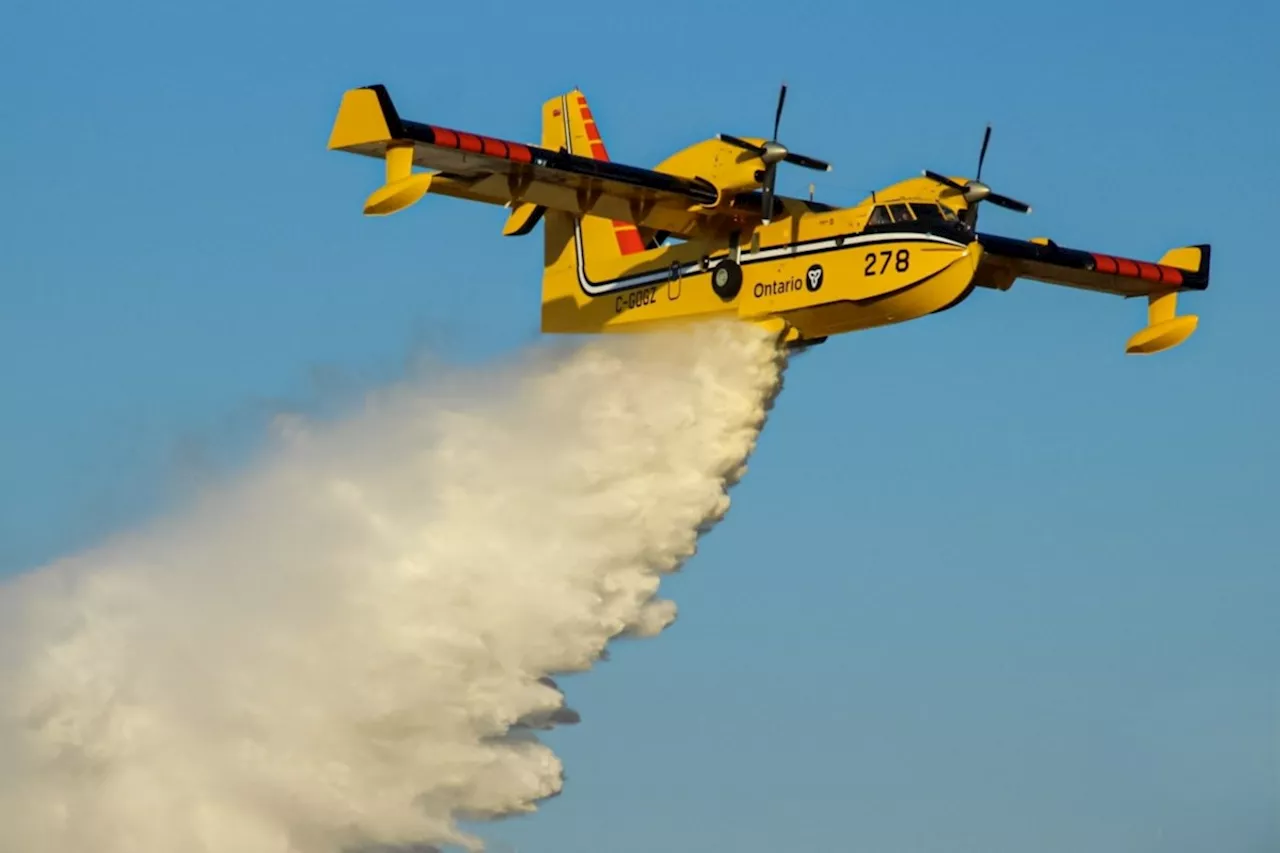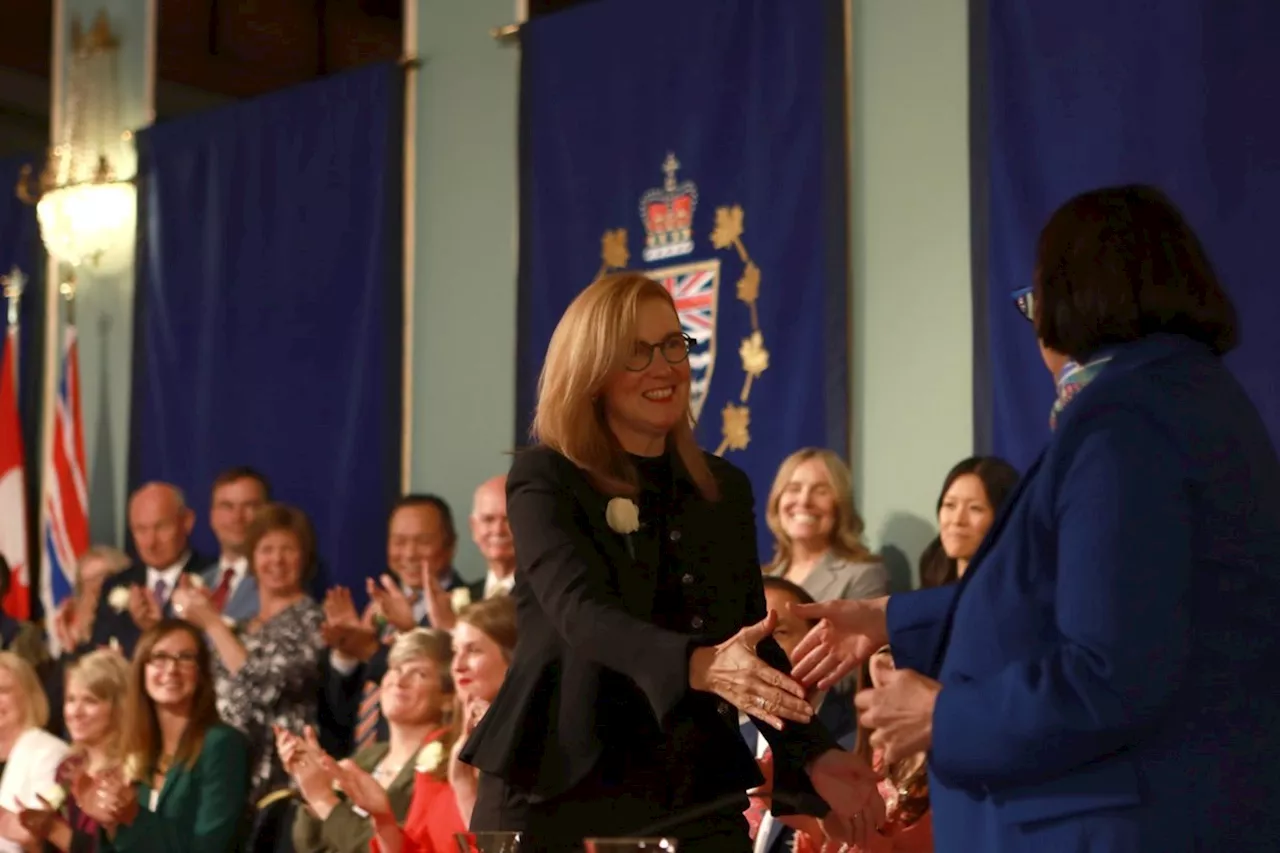Facing 'four years of unpredictability' from the U.S., British Columbia scrambles to balance its budget, scrapping a promised $1,000 grocery rebate and freezing public service hiring. Finance Minister Brenda Bailey cites the potential impact of U.S. tariffs under President Donald Trump as a driving force behind these difficult decisions.
The British Columbia government is scrapping a promised $1,000 grocery rebate and implementing a hiring freeze for certain public service positions to bolster its budget as it anticipates 'four years of unpredictability' stemming from the United States. Finance Minister Brenda Bailey stated on Thursday that the consequences of the 'reckless' and 'destabilizing' tariffs threatened by U.S. President Donald Trump are impossible to predict.
These actions come as British Columbia's budget is slated for presentation on March 4, coinciding with the expiration of a one-month reprieve on Trump's tariffs on Canadian goods and just over a week before tariffs on all foreign aluminum and steel could also commence. The province is already experiencing economic repercussions, even without the tariffs being implemented, and Bailey emphasized that it would be 'wrong to underestimate' their potential impact during a news conference. During the October election campaign, the governing New Democratic Party had pledged to deliver a $1,000 grocery rebate to all households in the current fiscal year ending March 31. Premier David Eby had positioned this promise as offering immediate relief, in contrast to the Opposition BC Conservative's tax-relief pledges, which he asserted would not materialize until 2026. Bailey expressed disappointment that the government cannot fulfill its election commitment regarding the rebate but explained that it would entail a $2-billion expense during an exceptionally challenging economic climate. 'This was a commitment that we very much wanted to make. We made it with the intention of doing it, but the world has changed,' she stated. 'It is our responsibility to ensure that we protect the core services for people in British Columbia, that we protect healthcare, that we protect education, that we protect social services, that we protect safety in our streets.' Bailey clarified that the hiring freeze applies to the province's public service, encompassing individuals who work within government ministries and directly for those ministries. Exemptions include crucial public service roles like correctional and social workers, as well as healthcare workers, which fall under the broader public sector. 'Our objective is to locate funds that haven't materialized precisely as we had anticipated. That's our primary approach and the most optimistic aspect,' she said. 'We will also be examining areas such as travel and consultancy costs, and identifying potential efficiencies across government.' Paul Finch, president of the BC General Employees' Union, indicated in an interview that the union was not informed about the freeze beforehand and has not yet reviewed the list of 'core' jobs that will be protected. 'The civil service plays an incredibly important economic role, not only in public safety, but also in seemingly mundane tasks such as the policy analysts who work on natural resource permitting and other key economic projects that we need to ensure continue, especially now in the face of a trade dispute,' he stated. Finch asserted that front-line positions are not overstaffed and emphasized the need for the government to adopt a 'measured and careful approach' when implementing such measures, suggesting a focus on the ratio of non-union managers to front-line workers, which he noted has shifted from 1:4 fifteen years ago to the current 1:3. Trump has declared his intention to impose a 25 percent tariff on most Canadian goods and a 10 percent tariff on energy. The United States also announced a 25 percent tariff on all foreign aluminum and steel earlier this week, which Trump stated would be added to the Canada-specific tariffs starting in mid-March. Bailey stated that economic modeling for the tariffs, and Canada's subsequent retaliation, predicts that British Columbia could lose $69 billion in GDP over four years and tens of thousands of jobs. 'We could never have envisioned a scenario where our closest neighbor effectively declares economic warfare on Canada. It's unimaginable, and the implications could be enormous,' she said. Bryan Yu, chief economist for Central 1 Credit Union, commented that the government faces a 'very challenging position' with the budget, and it would still be a challenge even if British Columbia waited until after March 4 to release it. 'I think regardless of when the budget would be presented, it would be within that overall cloud of uncertainty that's going to surround the budget, and I think that is the big challenge at this point, that uncertainty,' he stated. Yu added that the government's decision to err on the side of caution and ensure sufficient funds are available to address the potential impact of tariffs is 'probably necessary at this point.' Bailey confirmed that the government considered preparing two budgets due to the impending tariffs but ultimately decided against it, opting instead to develop a budget focused on safeguarding services. She emphasized that the budget incorporates the 'best estimates' from 13 senior economists across the country who comprise the B.C. Economic Forecast Council
BRITISH COLUMBIA ECONOMY TARIFFS DONALD TRUMP BUDGET HIRING FREEZE GROCERY REBATE PUBLIC SERVICE TRADE DISPUTE
Canada Latest News, Canada Headlines
Similar News:You can also read news stories similar to this one that we have collected from other news sources.
 British Columbia Cancels Grocery Rebate, Freezes Hiring Amid US Trade UncertaintyThe British Columbia government faces mounting economic pressure due to the threat of US tariffs, leading to the cancellation of a promised grocery rebate and a hiring freeze across non-essential departments. Finance Minister Brenda Bailey cited the unpredictable nature of the situation, emphasizing the need to prioritize core services and protect the province's economy.
British Columbia Cancels Grocery Rebate, Freezes Hiring Amid US Trade UncertaintyThe British Columbia government faces mounting economic pressure due to the threat of US tariffs, leading to the cancellation of a promised grocery rebate and a hiring freeze across non-essential departments. Finance Minister Brenda Bailey cited the unpredictable nature of the situation, emphasizing the need to prioritize core services and protect the province's economy.
Read more »
 US Wildlife Team Captures Wolves in British Columbia for Colorado ReleaseA team from Colorado Parks and Wildlife has begun capturing grey wolves in British Columbia to relocate to Colorado. The operation, lasting up to two weeks, aims to introduce up to 15 wolves annually over the next three to five years, following an agreement with the British Columbia government. The wolves will be tested, treated for disease, and collared before being released to help recover and maintain a self-sustaining wolf population in Colorado.
US Wildlife Team Captures Wolves in British Columbia for Colorado ReleaseA team from Colorado Parks and Wildlife has begun capturing grey wolves in British Columbia to relocate to Colorado. The operation, lasting up to two weeks, aims to introduce up to 15 wolves annually over the next three to five years, following an agreement with the British Columbia government. The wolves will be tested, treated for disease, and collared before being released to help recover and maintain a self-sustaining wolf population in Colorado.
Read more »
 Colorado to Capture Wolves from British Columbia for ReintroductionColorado officials are working to reintroduce grey wolves to the state by capturing up to 15 from British Columbia. The move aims to increase the chances of successful breeding and pack formation, adding genetic diversity to the Colorado wolf population.
Colorado to Capture Wolves from British Columbia for ReintroductionColorado officials are working to reintroduce grey wolves to the state by capturing up to 15 from British Columbia. The move aims to increase the chances of successful breeding and pack formation, adding genetic diversity to the Colorado wolf population.
Read more »
 British Columbia Ostrich Farmers Fight for Herd in Avian Flu OutbreakBritish Columbia ostrich farmers are appealing a Canadian Food Inspection Agency (CFIA) order to cull their 400-strong herd due to an avian flu outbreak. The farm, Universal Ostrich Farms Inc., argues that their ostriches could be valuable for studying the virus and possess unique research potential. They are requesting more time to demonstrate the health status of their flock and highlight the significance of their ongoing research with Dr. Yasuhiro Tsukamoto, who has extracted COVID-19 antibodies from ostrich eggs in British Columbia.
British Columbia Ostrich Farmers Fight for Herd in Avian Flu OutbreakBritish Columbia ostrich farmers are appealing a Canadian Food Inspection Agency (CFIA) order to cull their 400-strong herd due to an avian flu outbreak. The farm, Universal Ostrich Farms Inc., argues that their ostriches could be valuable for studying the virus and possess unique research potential. They are requesting more time to demonstrate the health status of their flock and highlight the significance of their ongoing research with Dr. Yasuhiro Tsukamoto, who has extracted COVID-19 antibodies from ostrich eggs in British Columbia.
Read more »
 Ontario Waterbombers Headed to British Columbia for California WildfiresOntario's Ministry of Natural Resources has revised its plan for wildfire support, sending two waterbombers from Dryden to British Columbia instead of potentially deploying them to California. The initial plan involved sending one waterbomber from Sault Ste. Marie and one from Dryden to British Columbia for possible deployment to California. However, the MNR has now confirmed that the two waterbombers from Dryden will be dispatched to British Columbia tomorrow, weather permitting. This decision comes as wildfires continue to rage in Southern California, fueled by high winds that have spread fires through communities like Pacific Palisades and Pasadena. Alberta, British Columbia, and Quebec have already sent resources to assist with California's wildfire response.
Ontario Waterbombers Headed to British Columbia for California WildfiresOntario's Ministry of Natural Resources has revised its plan for wildfire support, sending two waterbombers from Dryden to British Columbia instead of potentially deploying them to California. The initial plan involved sending one waterbomber from Sault Ste. Marie and one from Dryden to British Columbia for possible deployment to California. However, the MNR has now confirmed that the two waterbombers from Dryden will be dispatched to British Columbia tomorrow, weather permitting. This decision comes as wildfires continue to rage in Southern California, fueled by high winds that have spread fires through communities like Pacific Palisades and Pasadena. Alberta, British Columbia, and Quebec have already sent resources to assist with California's wildfire response.
Read more »
 Diet Analysis Helps Identify Ancient and Modern Human Remains in British ColumbiaAtmospheric river floods in British Columbia unearthed human remains, prompting a flurry of death investigations. While all turned out to be ancient Indigenous ancestors, a new diet analysis method is significantly speeding up the process of identifying old bones from modern ones.
Diet Analysis Helps Identify Ancient and Modern Human Remains in British ColumbiaAtmospheric river floods in British Columbia unearthed human remains, prompting a flurry of death investigations. While all turned out to be ancient Indigenous ancestors, a new diet analysis method is significantly speeding up the process of identifying old bones from modern ones.
Read more »
